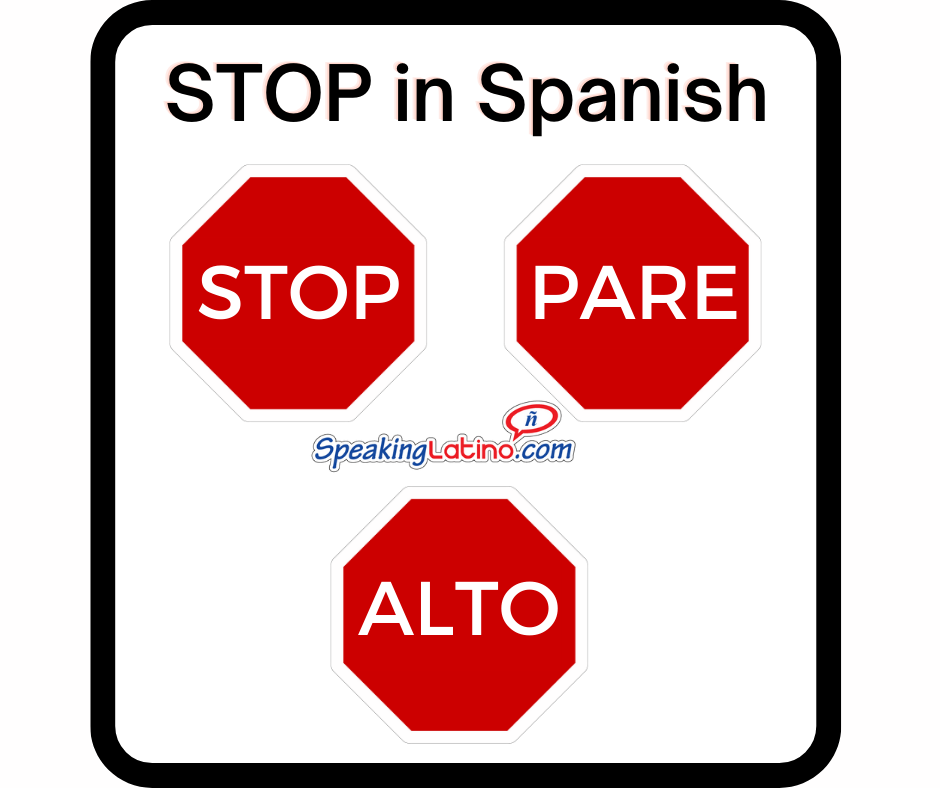The idea of expressing STOP in Spanish is extremely complicated. Are you referring to a stop sign, a romantic situation, something that bothers you? Is there urgency to stopping, annoyance or just a polite request? All of this influences which Spanish word to use, how to use it and what volume of voice you will use (to scream, talk firmly or softly).
Here is everything you need to feel comfortable to express STOP as you learn to speak Spanish.
The Diversity of STOP in Spanish
The word ‘alto’ can mean both ‘stop’ and ‘tall’ in Spanish, and is seen on stop signs in many Spanish-speaking countries like Mexico and Peru; other countries, however, have their own variations such as ‘Pare’ or simply ‘Stop’.
The verb ‘parar’ is a versatile way to say ‘stop’, applicable in multiple tense forms for different contexts, and can be made polite with the addition of ‘por favor’, like in ‘Pare, por favor’.
‘Detener’ is more formal and often used in legal contexts or with a reflexive pronoun, while ‘dejar de’ is a common phrase for stopping an ongoing activity and ‘impedir’ focuses on preventing actions or outcomes.
Stop signs around the Spanish-speaking world use three different words, depending on where you are: Stop, Pare or Alto.
Traffic STOP signs in Spanish

Visualize driving through Mexico’s lively streets, spotting an octagonal red sign reading ‘Alto’ – an authoritative halt command, ubiquitously seen in numerous Spanish-speaking countries. And it’s not just for traffic; ‘alto’ is a versatile player in the Spanish language, serving as both an interjection and a masculine noun in various contexts.
Picture yourself urgently using ‘alto’ to insist someone halt their actions immediately. But remember, ‘alto’ can also mean ‘tall’ when used as an adjective or a noun. Talk about versatility!
STOP Signs In The Spanish-Speaking World
The ‘alto’ sign is commonly seen in Central America, Colombia, Mexico, and Peru, similar to the English ‘Stop’ sign, ensuring consistency in traffic signals. However, Argentina, Chile, and Uruguay use ‘Pare’ on their stop signs, while Spain goes with the European standard ‘Stop’.

Envision strolling down Madrid’s streets, engrossed in the rhythm of Spanish dialogues. Here’s where ‘alto’ often pops up, quickly commanding someone to stop in urgent situations, such as ‘¡Alto! No corras’ (Stop! Don’t run). To emphasize immediacy without repetition, ‘alto’ can be paired with object pronouns in commands like ‘¡Alto! Dámelo’ (Stop! Give it to me).
But ‘alto’ isn’t just for high-stakes commands – in less urgent scenarios, it can be combined with polite language to softly request a pause, such as ¿Podrías hacer un alto aquí? (Could you stop here?). You can also say ¿Podrías parar aquí? which is a more common phrase to use from one country to the next.
Mastering Parar – The Common Verb for “Stop”

Consider ‘parar’, the Spanish equivalent of ‘stop’, as versatile as a Swiss Army Knife – it’s the most frequently used verb. It can transform into:
- ‘paro’ – I stop, just as a side note paro also means a workers strike.
- ‘paras’ – You stop
- ‘para’ – He or she stops
- ‘paramos’ – We stop
- ‘paráis’ – You all (informal) stop
- ‘paran’ – They or you all (formal) stop
in the present tense, and take on other forms in the preterite, present subjunctive, and imperative tenses.
Visualize a car halting by the roadside near a bus stop: ‘El coche paró de camino a la playa.’ (The car stopped on the way to the beach) Here, ‘parar’ is used intransitively, indicating that someone or something is stopping.
Polite Requests with “Pare”
In the realm of polite requests, ‘pare’ takes center stage. This form of ‘parar’ is used for the formal singular ‘you’ (Usted) and is a gentle way to command someone to stop. Envision a quiet library setting, where ‘Pare, por favor’ gently requests silence by combining ‘pare’ with ‘por favor’ – a softly uttered command.
Parar De – Stopping an Action
Visualize being in a lively Buenos Aires café, overhearing someone utter ‘Parar de hablar.’ This phrase, which means ‘to stop talking,’ illustrates the construction ‘parar de,’ used when talking about stopping a specific action. Depending on the region, ‘parar de’ and ‘dejar de’ can be used interchangeably to mean ‘to stop’ an action, such as “deja de llorar” meaning “stop crying.” In some cases, you might even hear the phrase “para ya” to emphasize the urgency of stopping the action.
In the negative imperative, ‘parar’ is conjugated as ‘no pares’ for informal ‘tú’ and ‘no pare’ for the formal ‘Usted’ to command someone not to stop doing something.
As a variation from parar de there is sin parar which means without stopping. For instance, the sentence Juan está trabajando sin parar translates as Juan is working without stopping but really means that he’s going all out at work, without a break, no pauses, nothing other than total work. Another way to explain this use of sin parar is non-stop.
Detener – Formal and Reflexive Ways to Stop
Now, let’s transition into the formal domain of ‘detener,’ a verb prevalent in written, formal, or legal contexts. While ‘detener’ focuses on the action of stopping, its reflexive form ‘detenerse’ spotlights the state resulting from the stopping action.
Formal Usage of Detener
Take this into account: ‘El sospechoso fue detenido.’ In this sentence, ‘detenido’ is used in a passive construction to indicate that ‘the suspect was detained,’ a common usage in legal and formal contexts. The imperative forms ‘detenga’ and ‘detengan’ are used when issuing formal orders and commands, giving ‘detener’ a sense of authority.
From newspapers to judicial documents, the word stop in Spanish, ‘detener’, takes on a formal role, highlighting the diversity of ‘stop’ in the language.
Reflexive Use with Detenerse
When it comes to self-initiated stopping actions, ‘detenerse’ is the reflexive form that comes to the fore. In Spanish, reflexive pronouns such as me, te, se, nos, os, or se are used with ‘detenerse’ to match the subject of the sentence, making this form applicable to various subjects, including people and vehicles.
For instance, ‘Rubén, detente, me estás molestando,’ which means ‘Ruben, stop it, you’re annoying me’.
Interrumpir – Unexpected Pauses and Interruptions

When life presents unexpected situations, the Spanish verb ‘interrumpir’ proves useful. This verb, which means ‘to interrupt,’ is used to express an unexpected stop or pause of something happening. Take for example: ‘Debemos interrumpir el acto por la tormenta,’ which translates to ‘We have to stop the event because of the storm’ – a sudden interruption caused by unforeseen circumstances.
Or a scenario demanding immediate cessation of activities, like ‘Siento interrumpir su sesión de escritura, pero algo ha pasado,’ meaning ‘Sorry to interrupt your writing session, but something’s happened’.
Poner Fin A – Ending Situations and Relationships

As we traverse the diverse terrain of ‘stop’ in Spanish, we come across ‘poner fin a,’ a phrase that captures the metaphorical essence of stopping or ending a scenario, action, or process. In personal and emotional contexts, it can be used to:
- end intimate situations like a romantic relationship
- put an end to a disagreement or argument
- stop a bad habit or behavior
- bring closure to a project or task
Beyond personal realms, ‘poner fin a’ also signifies the end of professional collaborations or contractual agreements. Further, it steps into the socio-political arena, advocating for the cessation of broader issues or campaigns.
Dejar De – Stopping an Ongoing Activity
Next, we delve into the domain of ongoing activities with ‘dejar de.’ This Spanish phrase is used to command someone to stop doing something such as a bad habit and always requires an infinitive verb to follow, like in ‘deja de hablar’ (stop talking).
Note that the correct structure always pairs ‘dejar de’ with an infinitive verb, as using a gerund (verb ending in -ing) is incorrect in Spanish. In some cases, people might use the phrase “basta ya” to convey a similar message of stopping an action.
From casual chats to authoritative speeches, ‘dejar de’ signifies the cessation of various actions or habits. When used in the past tense, ‘dejar de’ conveys that an action has stopped, like ‘Él dejó de comer’ (He stopped eating).
More phrases with dejar de:
- dejar de fumar – to quit smoking
- dejar de molestar a tu hermano – to stop bothering your brother
- dejar de roncar – to stop snoring
- dejar de morderse las uñas – to stop biting your nails
- dejar de correr – to stop running
Impedir – Preventing Undesirable Outcomes
In the context of preventing undesirable outcomes, ‘impedir’ emerges as a primary verb in Spanish. It translates to ‘to prevent,’ ‘to stop,’ or ‘to impede’ and is used to express prevention across various dimensions, from hindering actions to avoiding negative outcomes. As part of a family of around 30 verbs, ‘impedir’ follows a specific conjugation pattern similar to ‘pedir’, making Spanish an intriguing language full of patterns and exceptions.
Common Phrases for Asking Someone to Stop
While exploring various ways to say stop in Spanish, it’s beneficial to acknowledge some prevalent phrases and expressions used to request someone to halt. Here are a few examples:
- Deja de hablar – stop talking
- ¡Haz silencio! – Be quiet!
- Para un momento – stop for a moment
- Detente – stop!
- No sigas – don’t continue, stop it
You can also use the following phrases to ask someone to stop making noise:
- ‘¿Puedes parar con ese ruido?’ (Can you stop making that noise?)
- ‘¡Deja de hacer ruido!’ (Stop making noise!)
- ‘¡Deja de hacer bulla!’ (Stop making a racket!)
These phrases can be used to politely or firmly ask someone to be quiet or stop crying.
Frequently Asked Questions
¿Qué significa Stop in English?
“Stop” in English means to finish doing something or come to a halt, such as a vehicle or a person. For example, “When do you think the snow will stop?” or “I stopped to ask a policeman for directions.”
¿Qué significa el verbo stopped?
“Stop” en español significa “detener” o “parar”. Por ejemplo, “The driver stopped the taxi at the intersection.” Entonces, “stopped” significa “detuvo” en este contexto.
How do you express unexpected stops or pauses in Spanish?
You can express unexpected stops or pauses in Spanish using the verb ‘interrumpir’.
What is the difference between ‘detener’ and ‘detenerse’?
Detener focuses on the action of stopping, whereas detenerse emphasizes the resulting state or condition after stopping.